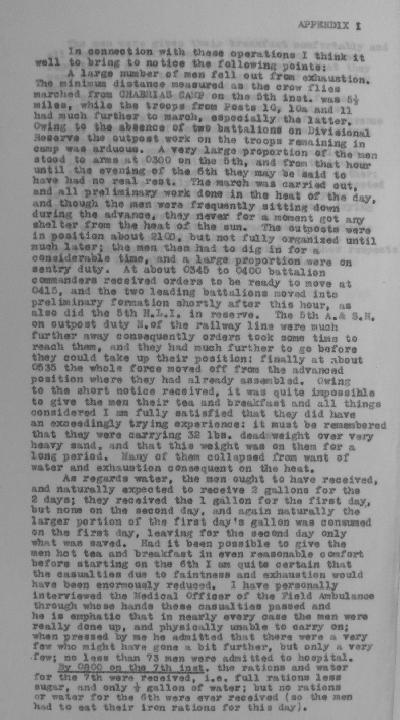Topic: AIF - DMC - British
Battle of Romani
Sinai, August 4 to 5, 1916
157th Infantry Brigade War Diary Account, Appendix

The transcription:
Appendix 1
(See: 157th Infantry Brigade War Diary Account )
In connection with these operations I think it well to bring to notice the following points:
A large number of men fell out from exhaustion. The minimum distance measured as the crow flies marched frost Chabrias Camp on the 5th inst, was 5½ miles, while the troops from Posts 10, 10a and 11 had much further to march, especially the latter. Owing to the absence of two battalions on Divisional Reserve the outpost work on the troops remaining in camp was arduous. A very large proportion of the men stood to arms at 0300 on the 5th, and from that hour until the evening of the 6th they may be said to have had no real rest. The march was carried out, and all preliminary work done in the heat of the day, and though the men were frequently sitting down during the advance, they never for a moment got any shelter from the heat of the sun. The outposts were in position about 2100, but not fully organised until much later; the men then had to dig in for a considerable time, and a large proportion were on sentry duty. At about 0345 to 0400 battalion commanders received orders to be ready to move at 0415, and the two leading battalions moved into preliminary formation shortly after this hour, as also did the 5th Highland Light Infantry in reserve. The 5th Argyle and Sunderland Highlanders, on outpost duty north of the railway line were much further away consequently orders took some time to reach these, and they had much further to go before they could take up their position: finally at about 0535 the whole force moved off from the advanced position where they had already assembled. Owing to the short notice received, it was quite impossible to give the men their tea and breakfast and all things considered I an fully satisfied that they did have an exceedingly trying experience; it must be remembered that they were carrying 32 lbs, dead weight over very heavy sand, and that this weight was on them for a long period. Many of them collapsed from want of water and exhaustion consequent on the heat.
As regards water, the men ought to have received, and naturally expected to receive 2 gallons for the 2 days; they received the 1 gallon for the first day, but none on the second day, and again naturally the larger portion of the first day's gallon was consumed on the first day, leaving for the second day only what was saved. Had it been possible to give the men hot tea and breakfast in even reasonable comfort before starting on the 6th I am quite certain that the casualties due to faintness and exhaustion would have been enormously reduced. I have personally interviewed the Medical Officer of the Field Ambulance through whose hands these casualties passed and he is emphatic that in nearly every case the men were ready done up, and physically unable to carry on; when pressed by me he admitted that there were a very few who might have gone a bit further, but only a very few; no less than 73 men were admitted to hospital.
By 0800 on 7th inst. the rations and water for the 7th were received, full rations less sugar, and only ½ gallon of water; but no rations or water for the 6th were over received (so the men had to eat their iron rations for this day).
The men were given their breakfast comfortably and all Commanding Officers and many Company Officers reported to me on the morning of the 7th that they were quite ready to move on again after the midday meal, and that they expected to do so.
I spoke to many men of each unit myself, and found them all very cheery and quite ready for further efforts; there was a most gratifying absence of any suspicion of complaint, or of the slightest tendency to grouse.
I have many exceptionally strong and athletic officers but it was quite obvious to me that many of then had nearly reached the end of their tether; if officers are really done, then it may be accepted as a fact that men must have had a very trying experience, and in this instance, much more trying than I was at first inclined to think.
I am of opinion that this practically experience though it has probably taken a bit out of the men towards the end of a hot season will in other respects have done them all a great deal of good.
Appendix 2
The following table gives details of casualties.
Strength Started 2,579 Fell out in the two days 374 14.5% Admitted to Hospital 73 2.75% Not yet rejoined but mostly accounted for 202 7.75%
Further Reading:
Battle of Romani, Sinai, August 4 to 5, 1916, Roll of Honour, British Forces
Battle of Romani, Sinai, August 4 to 5, 1916
Bir el Abd, Sinai, 9 August 1916
Battles where Australians fought, 1899-1920
Citation: Battle of Romani, Sinai, August 4 to 5, 157th Infantry Brigade War Diary Account, Appendix



